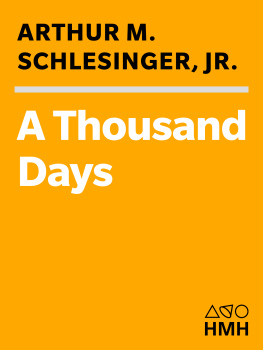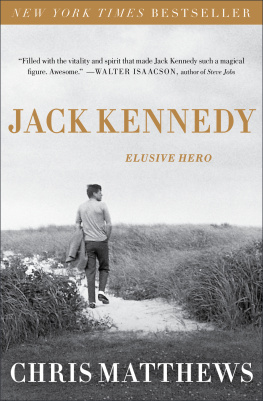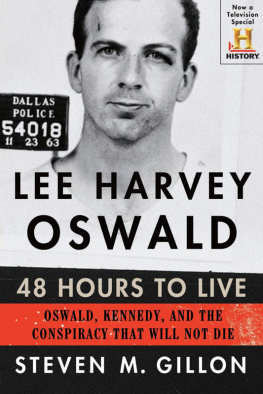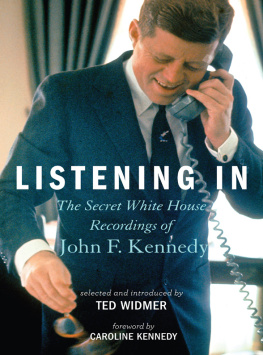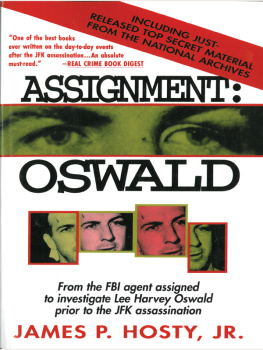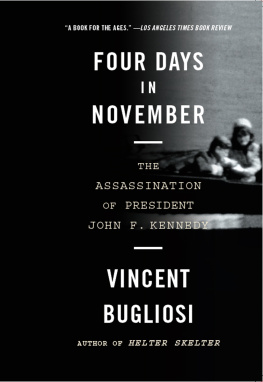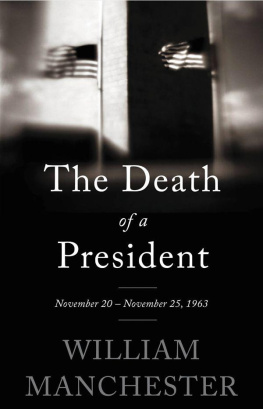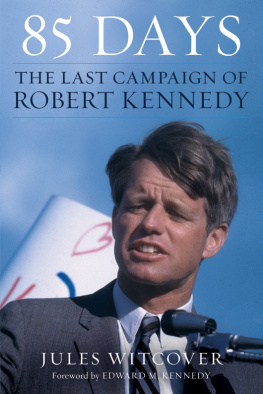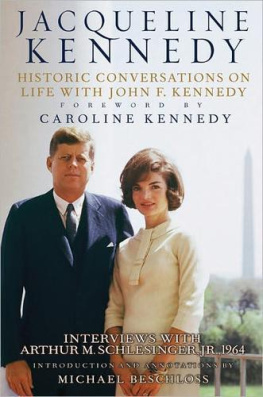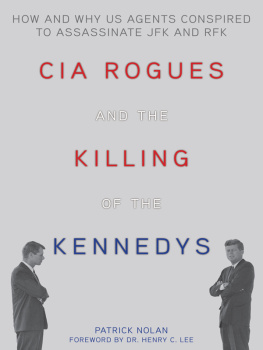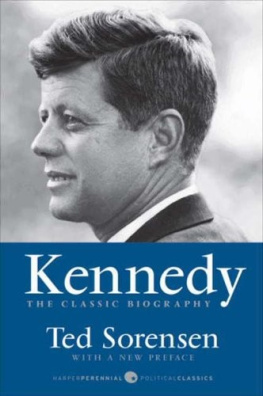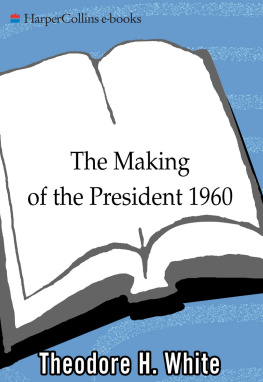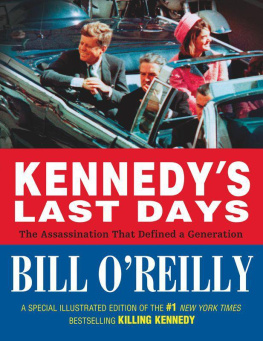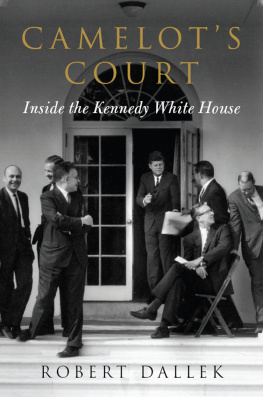First Mariner Books edition 2002
Copyright 1965, 2002 by Arthur M. Schlesinger, Jr.
Copyright renewed 1993 by Arthur M. Schlesinger, Jr.
All rights reserved
For information about permission to reproduce selections from this book, write to or to Permissions, Houghton Mifflin Harcourt Publishing Company, 3 Park Avenue, 19th Floor, New York, New York 10016.
www.hmhco.com
Library of Congress Cataloging-in-Publication Data is available.
ISBN 0-618-21927-7
e ISBN 978-0-547-52450-4
v4.0317
In memory of
John Fitzgerald Kennedy
If people bring so much courage to this world the world has to kill them to break them, so of course it kills them. The world breaks every one and afterward many are strong at the broken places. But those that will not break it kills. It kills the very good and the very gentle and the very brave impartially.
H EMINGWAY
Foreword to the 2002 Edition
T HIS BOOK WAS WRITTEN in the grim months after John F. Kennedys assassination on November 22, 1963. A Thousand Days has the advantages and disadvantages of a book composed so soon after the fact Immediacy gives it vividness. It also gives a kind of knowledge denied those who were not around when history happened. As Alexis de Tocqueville once observed, participants understand better than posterity the movements of opinion, the popular inclinations of their times, the vibrations of which they can still sense in their minds and hearts. Posterity of course has its compensating advantagesa cooler perspective, knowledge of consequences, access to declassified documents and private papers, the diverse illuminations of hindsight. Also, as Mr. Dooley pointed out, Ye are not subjict to interruptions be people who were there.
History is a permanent debatean argument without end, as Pieter Geyl, the eminent Dutch historian, put it. Historians, like everyone else, are prisoners of their own experience. Their priorities are shaped by the pressures of their time. Each new generation of historians has its distinctive preoccupations in the present, and, consequently, its distinctive demands on the past. The result is chronic fluctuation in historical verdicts. Reputations rise and fall like stocks on Wall Street, determined by the supply and demand equations of a later age. The reputation of American presidents is particularly dependent on the climate in which historians hand down their judgments.
In the conservative 1950s, I published The Crisis of the Old Order, the first volume of The Age of Roosevelt. The bitter politics of the 1930s had not yet abated, and many Americans still loathed that man in the White House. Conscious of the continuing hatred, I noted in the foreword that this was, I supposed, a bad time to be writing about FDR. The reputation of a commanding figure is often at its lowest in the period ten to twenty years after his death. We are always in a zone of imperfect visibility so far as the history just over our shoulder is concerned. It is as if we wrote in the hollow of the historical wave; not until we reach the crest of the next one can we look back and estimate properly what went on before. Today, of course, recollected in tranquility, FDR is routinely rated, by conservatives as well as by liberals, as one of the three greatest American presidents.
Some years after the publication of A Thousand Days in November 1965, President Kennedy was in the hollow of the historical wave. His reputation was further buffeted by external events. The Vietnam War persuaded some scholars that U.S. foreign policy was inherently imperialistic. Watergate disillusioned them about presidential power. Kennedy revisionism gathered force. Critics dismissed him as charming but superficial, a triumph of style over substance, concerned with image rather than achievement, a man who talked big but accomplished little. In the darker version, Kennedy became an incorrigible philanderer, a reckless risk-taker in both private and public life, a bellicose fellow who ordered the assassination of foreign leaders, almost provoked a nuclear war with the Soviet Union, plunged the nation into the Vietnam morass and, between needless international crises, turned the White House into a virtual bordello.
When American Heritage magazine asked scholars in 1988 to name the single most overrated figure in American history, JFK received more votes than anyone else. One historian summed up the revisionist case: His public relations approach to the presidency was an almost total disaster for the nation.... The revelations of his private life have added more tarnish to the once golden image.
Revisionism, it should be said, did not affect popular admiration of Kennedy. Ordinary Americans remembered a strong and stirring president who saved the peace in the most dangerous moment of the Cold War, assumed leadership in the struggle for racial justice, initiated the exploration of space, laid the foundation for federal aid to the arts and humanities, tapped the republics latent idealism and infused a generation with a passion for public service. They cherished the idea of Camelot and its brief shining hours.
And recent years have seen a perceptible recovery of Kennedys reputation among scholars. This is partly due to the passage of time; we are now on the crest of the next wave. And it is especially due to the documentation of Kennedys leadership in the Cuban missile crisis in The Kennedy Tapes (1997), edited by Ernest May and Philip Zelikow. Their three-volume set, The Presidential Recordings: John F. Kennedy, The Great Crises (2001), further enhances Kennedys standing as a calm, thoughtful, resolute and, above all, substantive president.
He glittered when he lived, and the whole world grieved when he was killed. Grief nourishes myth. The slain hero, robbed of fulfillment by tragic fate, is the stuff of legend. Myth breeds countermyth. With the perspective of forty years we can perhaps disentangle myth and reality.
Let us first dispose of Camelot. JFK had gone to Choate and Harvard with Alan Jay Lerner. He liked Lerner, and he liked the songs Lerner wrote with Frederick Loewe for the popular 1960 musical. But during his lifetime no one spoke of Kennedys Washington as Camelot. Had anyone done so, no one would have been more derisive than JFK. Nor did those of us around him see ourselves for a moment as knights of the Round Table. You will note the absence of Arthurian allusions in the text that follows.
Camelot was Jacqueline Kennedys grieving thought to the journalist Theodore H. White a week after her husband was killed. She thereby launched a myth that time turned into a clich. Later she told John Kenneth Galbraith that she feared she had overdone Camelot. For that matter, King Arthurs Camelot was hardly noted for marital constancy and concluded in betrayal and death.
Then a word about the 1960 election. A recurrent myth is that the Kennedys stole the election in Illinois and that Richard Nixons finest hour was his patriotic refusal to upset the nation by contesting the result. In fact, Illinois was not crucial to Kennedys victory. Had he lost Illinois, Kennedy still would have won the electoral collegeand the presidencyby 270 to 246. And if Mayor Richard Daleys men stole votes in Cook County, Republicans stole votes downstate. The state electoral board, 4 to 1 Republican, voted unanimously to certify the Kennedy electors.
An associated myth is that Joseph P. Kennedy made a deal in the winter of 195960 with a Chicago gangster named Sam Giancana to use trade unions under mob control to turn out the Chicago vote for his son. In fact, the only big union under mob influence was the Teamsters Unionand the Teamsters, led by Robert Kennedys enemy Jimmy Hoffa, were for Nixon.
Giancana was known to the Kennedy family but hardly in a way that would have made him an ally. Robert Kennedy, as counsel to the Senate Rackets Committee in 1958, succinctly described Giancana as chief gunman for the group that succeeded the Capone mob. Called before the Rackets Committee, Giancana declined to answer questions on the grounds that his answers might tend to incriminate himand giggled as he declined. Robert Kennedy said bitingly, I thought only little girls giggled, Mr. Giancana. In his book
Next page
